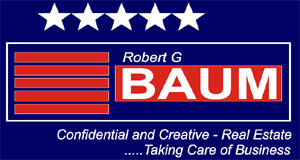-

- Robert G. Baum
Commericial Real Estate
79 St. James Street
Kingston, NY 12401
Lower Hudson Valley:
(845) 242-2100
Capital District, NY
& Berkshires:
(413) 209-0013 -

-
-
Buying Commercial Property
Things you ought to know before buying commercial real estate.
1. Weigh pros and cons
List the benefits and drawbacks of purchasing to help decide whether it’s the right choice. For example – PRO: A purchase can offer tax advantages, such as deductions for real estate taxes, insurance, utilities and other expenses, and it may increase in value over the long term. CON: It can reduce your liquidity, since the money you spend will not be available for other expenses. You will also be responsible for maintenance and repairs, which can cut into your cash flow and distract you from focusing on your core business.
2. Develop forecasts
Think through the long-term costs of owning versus renting. Evaluate the market to get an idea of how much you might spend. Work with your accountant to review your income and expenses and determine how much you can afford. Remember to factor costs associated with owning—such as taxes and debt service—and the savings, such as tax deductions. Keep in mind, too, that rents may rise—so while owning may be more expensive than renting short-term, it could prove more economical in the long run since your payments will remain steady.
3. Assemble a team of experts
Choose a broker, a lawyer and a certified public accountant with strong experience in commercial real estate to guide you through the purchasing process. These experts can help you evaluate properties, prepare financial statements and make sure contracts are solid before you sign them. Identify a lender with a proven track record in commercial real estate to help you secure financing once you select a property.
4. Shop for the right property
What you look for in commercial space will depend on your business. For example, a parking area may be important to retailers, while a distributor might need a large loading dock. Other considerations include:
- Location. Is the building close to customers, employees and vendors or suppliers? Depending on your business, proximity to rail lines or shipping lanes may also beimportant. The Small Business Administration (SBA) offers additional tips for choosing a location.
- Allowable uses. You’ll need to comply with zoning laws and other rules. For example, some cities require businesses to close by a certain time or to limit their signage.
- Expansion potential. Will the property accommodate your business as it grows? Conversely, will you be able to lease out space if the company doesn’t grow as anticipated?
5. Perform due diligence
Make sure there are no issues with the property that could compromise your business later on. Ask your broker to recommend engineers or other experts to inspect the property and alert you to potential pitfalls such as environmental contamination, structural defects or outdated wiring. You should also work with a title company to make sure no insurance claims or litigation affect the property.
6. Secure financing
The final step for most buyers is applying for a loan. Ideally, you will have already established a relationship with a bank that can help you apply for a commercial loan or explore other options, such as financing backed by the SBA. Your banker can help you identify the best course for your company. The SBA site includes an explanation of its loan programs for commercial property purchases. Securing a loan requires a significant amount of paperwork. You may need to produce business and personal tax returns for the past three years, balance sheets or fiscal year-end statements, and cash flow statements and projections, among other documents. Gather these early on to help save time when applying for a loan.
7. Find a commercial real estate agent!
It’s difficult to do all of these things alone. With all the complications of buying commercial property, consider finding a commercial real estate agent. When it comes to helping investors buy commercial real estate, we can provide guidance, property valuation, comparable sales reports, targeted marketing, demographic reports, traffic counts and contract negotiations. We can provide a full range of buyer representation services to all clients. If you need help to find potential commercial properties, assistance with your strategy, we have the expertise.

